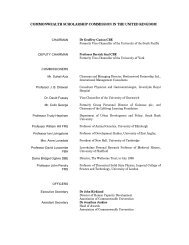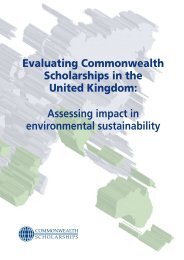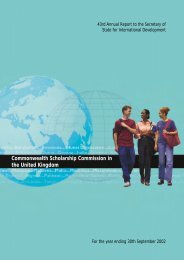Issue 6 - Commonwealth Scholarship Commission in the United ...
Issue 6 - Commonwealth Scholarship Commission in the United ...
Issue 6 - Commonwealth Scholarship Commission in the United ...
You also want an ePaper? Increase the reach of your titles
YUMPU automatically turns print PDFs into web optimized ePapers that Google loves.
TACKLING CLIMATE CHANGE<br />
AROUND THE COMMONWEALTH<br />
Climate change is <strong>the</strong> hot topic of <strong>the</strong> moment, and many of our <strong>Commonwealth</strong> Scholars<br />
and alumni are study<strong>in</strong>g or work<strong>in</strong>g <strong>in</strong> areas that exam<strong>in</strong>e its impact. <strong>Commonwealth</strong><br />
countries will be among those most affected by <strong>in</strong>creases <strong>in</strong> global temperature and <strong>the</strong><br />
consequences, and so our award holders’ work is of <strong>the</strong> utmost relevance both to <strong>the</strong>ir<br />
home country and worldwide.<br />
© Andrew Hall<br />
PROTECTING SRI LANKA’S AGRICULTURAL<br />
ECONOMY<br />
Iroja Caldera is a<br />
<strong>Commonwealth</strong> Split-site<br />
Scholar work<strong>in</strong>g on a PhD<br />
<strong>in</strong> Environmental Science<br />
(University of Sheffield<br />
and University of<br />
Colombo). Iroja’s work is<br />
concerned with <strong>the</strong><br />
effects of global warm<strong>in</strong>g<br />
on tea production <strong>in</strong> Sri<br />
Lanka. Environmental Iroja Caldera<br />
factors such as <strong>Commonwealth</strong><br />
temperature and carbon Alumnus from<br />
dioxide concentration Sri Lanka<br />
affect <strong>the</strong> productivity of<br />
<strong>the</strong> plant. So, future climate change could affect <strong>the</strong><br />
quality of tea and <strong>in</strong>deed tea production as a whole.<br />
Sri Lanka is <strong>the</strong> world’s second largest exporter of<br />
black tea and <strong>the</strong> third largest tea producer. The tea<br />
<strong>in</strong>dustry has a significant socio-economic impact on<br />
<strong>the</strong> country. It is <strong>the</strong> highest earn<strong>in</strong>g agricultural<br />
export and also provides employment to a large<br />
number of people as tea is a labour-<strong>in</strong>tensive<br />
plantation crop.<br />
Iroja hopes that her work will contribute to a better<br />
understand<strong>in</strong>g of how tea plants may respond to<br />
climate change. This may facilitate <strong>the</strong><br />
development of adaptation measures to help<br />
lessen possible negative impacts on tea cultivation<br />
due to environmental change. As a lecturer<br />
attached to <strong>the</strong> University of Colombo, Iroja hopes<br />
that her experience as a researcher will lead to<br />
<strong>in</strong>volvement <strong>in</strong> capacity build<strong>in</strong>g activities <strong>in</strong> her<br />
home country.<br />
THE EFFECTS OF GLOBAL WARMING ON<br />
OUR OCEANS<br />
Dr Graham Hughes (<strong>Commonwealth</strong> Scholar, PhD<br />
<strong>in</strong> Geophysics, University of Cambridge, 1991-<br />
1994) is currently a Fellow <strong>in</strong> <strong>the</strong> Geophysical Fluid<br />
Dynamics Group at <strong>the</strong> Australian National<br />
University. His research exam<strong>in</strong>es <strong>the</strong> impact of<br />
climate change on oceans. Oceans transport a vast<br />
amount of heat, so understand<strong>in</strong>g changes to <strong>the</strong><br />
earth’s climate necessitates understand<strong>in</strong>g ocean<br />
circulation.<br />
The circulation of oceans is forced by w<strong>in</strong>ds<br />
blow<strong>in</strong>g over <strong>the</strong> sea surface and fluxes of heat and<br />
water through <strong>the</strong> sea surface. Surface waters ga<strong>in</strong><br />
heat at lower latitudes and lose heat at high<br />
latitudes. Of particular significance for climate<br />
processes is <strong>the</strong> ‘overturn<strong>in</strong>g’ component of <strong>the</strong><br />
circulation that allows <strong>the</strong> bulk of <strong>the</strong> ocean, below<br />
<strong>the</strong> surface, to exchange heat with <strong>the</strong> atmosphere.<br />
Global warm<strong>in</strong>g is likely to <strong>in</strong>crease <strong>the</strong> supply of<br />
freshwater to high latitudes. This effect, and warmer<br />
average surface conditions, will reduce high-latitude<br />
dense water formation, lead<strong>in</strong>g to a slow<strong>in</strong>g of <strong>the</strong><br />
overturn<strong>in</strong>g circulation. This is expected to lead to a<br />
cooler nor<strong>the</strong>rn hemisphere, <strong>the</strong> extreme scenario<br />
follow<strong>in</strong>g a (rapid) shutdown of <strong>the</strong> circulation be<strong>in</strong>g<br />
popularised <strong>in</strong> <strong>the</strong> Hollywood movie ‘The Day After<br />
Tomorrow’!<br />
Graham’s research has concentrated on <strong>the</strong><br />
circulation supported by surface fluxes of heat and<br />
water, address<strong>in</strong>g questions such as how <strong>the</strong><br />
circulation is modified when <strong>the</strong>se fluxes change.<br />
Results thus far show that <strong>the</strong> circulation is extremely<br />
sensitive to changes <strong>in</strong> <strong>the</strong> surface fluxes. The<br />
implications for earth’s climate can be assessed with<br />
<strong>the</strong> help of numerical coupled ocean-atmosphere<br />
models.<br />
A weakened overturn<strong>in</strong>g ocean circulation is<br />
expected to lead to a cooler nor<strong>the</strong>rn hemisphere<br />
6 <strong>Commonwealth</strong> <strong>Scholarship</strong>s News

















